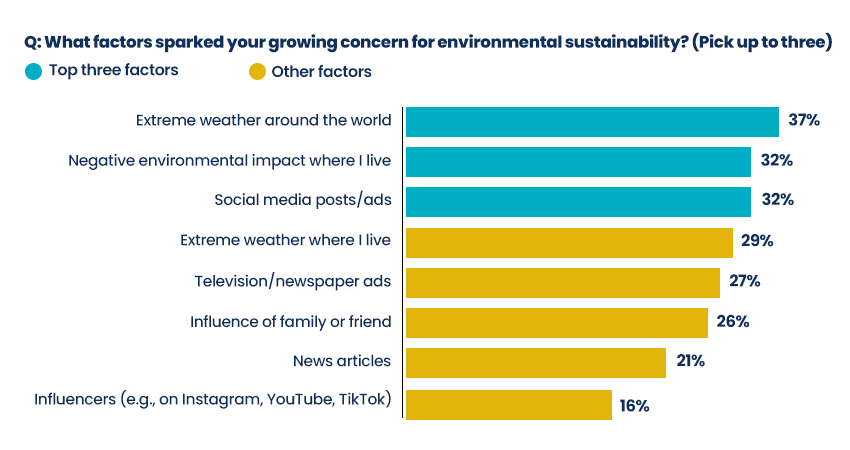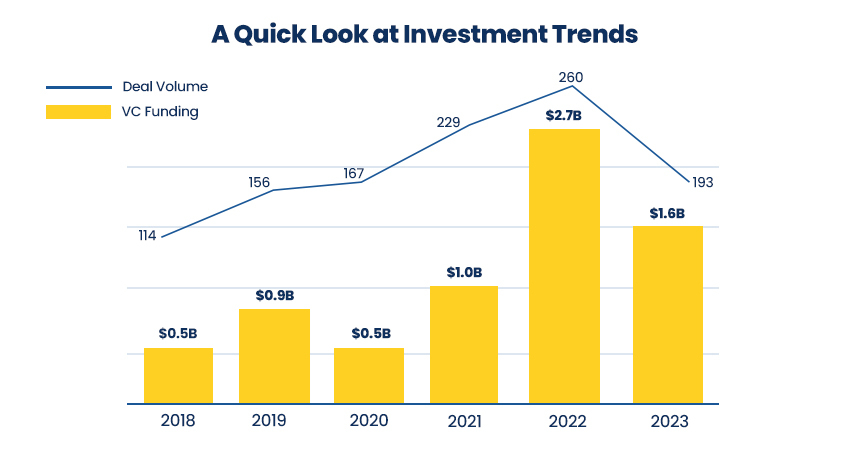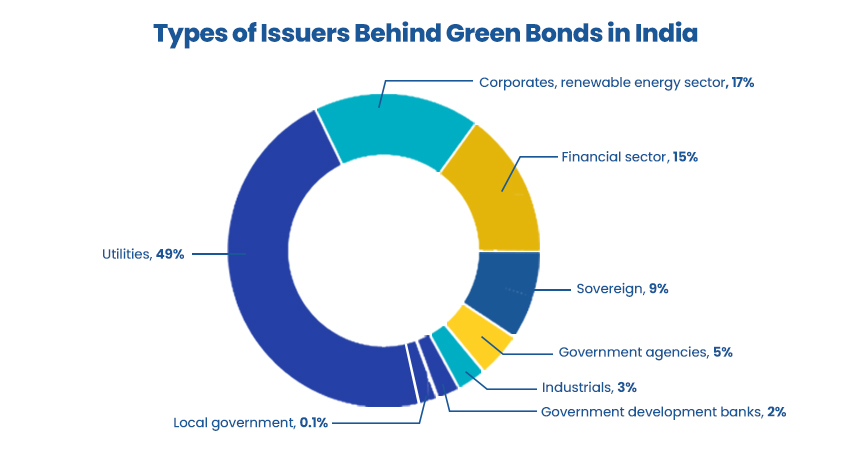In India, going green isn’t just a trend anymore, it’s becoming a way of life. A 2024 Bain & Company survey found that nearly 80% of Indian consumers are “very” or “extremely” concerned about climate change and environmental sustainability, and 60% are willing to pay a premium for eco-friendly products. Price and convenience are no longer the only drivers; today’s consumers are increasingly choosing products that align with their eco-conscious values, sustainability goals, and ethical beliefs. From switching to electric vehicles to opting for organic food and eco-friendly packaging, what was once a niche lifestyle is rapidly becoming the new mainstream.
As a venture capitalist (VC) eyeing future opportunities, this shift in consumer behavior is essential. Understanding how and why Indians are embracing climate-conscious choices can open the door to investments that are not only profitable but also impactful, as it will go straight to their hearts.
Why Climate-Conscious Consumers Are No Longer Niche
nvironmental consciousness is no longer confined to a small group of activists or urban elites; in fact, it’s becoming a part of everyday life for many Indians. More and more people are thinking twice about how their choices affect the planet and hold concerns about sustainability that shape their daily choices. From the products they buy to the way they travel. This shift marks the rise of a new kind of consumer behaviour where buyers expect brands to be part of the solution, not the problem.
A 2025 Ipsos survey also backs this transformation, which showed 92% Indians worry about environmental issues, while a Mahindra Group study found that 80% of people realize their actions impact the environment ,and 83% are open to simple eco-friendly habits like carpooling or using public transport.
These numbers substantiate that for businesses, aligning with environmental values is no longer an option. In fact, it’s now essential for relevance, growth, and long-term consumer loyalty.

(Source: Bain & Company)
Indian Consumers Value Sustainability
Here’s a quick snapshot to illustrate this shift:
| Consumer Behavior | India (%) | Global (%) |
| Prioritise sustainability in purchases | 70% | 37% |
| Willing to change purchase patterns | 79% | N/A |
(Source: businesschief.asia)
Indian consumers care about the planet and are willing to adjust their buying behaviours. This presents a massive opportunity for startups that align their offerings with these values.
The Value-Action Gap: Intention vs. Real Action
Even though more and more people today are aware of environmental issues and express a desire to live more sustainably, there’s often a gap between what they say and what they do. This is called the “value-action gap.” It’s a common human behaviour where intentions don’t always translate into action.
Many consumers genuinely care about the planet and say they prefer eco-friendly products, but when it comes down to everyday choices, old habits often win. Why? It usually comes down to a few simple reasons: sustainable options might feel too expensive, too inconvenient, or people just aren’t sure what the “right” choices are. For example, while a global market average of 70% of people believe they know how to tackle climate change, their daily actions, like the way they commute, shop, or dispose of waste, don’t always match up with that belief.
The challenge and opportunity for startups, brands, and VCs is to help close this gap. By making sustainable choices easier, more affordable, and seamlessly woven into daily life, businesses can help people turn good intentions into real action. When sustainability becomes the simpler, smarter choice, behaviour shifts follow naturally.
Consumer Triggers: Climate Events Shape Habits
For many people in India, climate change isn’t some distant problem; now it’s something they’re living through. Scorching heat waves, flash floods, and toxic air have become part of daily life for millions. It’s no surprise, then, that 40% of Indian consumers, according to Bain & Company, say their own experience with extreme weather pushes them to make more eco-friendly choices.
As these climate disruptions become more frequent, more people will look for ways to live and shop responsibly. This creates an opportunity for startups and brands offering real solutions, whether it’s cleaner energy, sustainable fashion, or eco-friendly packaging, by making them affordable and accessible. When people feel the impact of climate change firsthand, they are far more likely to act on it.
The Role of VCs: Turning Consumer Intent into Scalable Impact
India’s climate-tech sector has been gaining significant attention from investors. Between 2018 and 2023, climate-tech startups in the country raised an impressive ₹ 60,120 crore in venture capital funding.
Nearly 55-60% of this funding has fueled the growth of electric vehicles, battery technology, and charging infrastructure, laying the groundwork for cleaner mobility. Another 15-20% has gone into mobility services like electric taxis, which are quietly changing the way people move around cities.
Investment Trends at a Glance

(Source: b.capital)
What Today’s Investors Care About
Today’s investors back businesses that blend purpose with performance, offering real solutions to real problems while scaling their impact. Here’s what they value most:
- Genuine consumer demand: Investors back ideas that solve real problems. It’s not enough to offer token solutions. Your products and services must address genuine consumer needs and bring meaningful change to everyday lives.
- Scalability: Investors want to see businesses that can move beyond niche markets and serve millions, all while maintaining their positive environmental or social impact. The bigger the vision, the better the backing.
- Impact verification: Sustainability claims need to be more than just words. Investors look for measurable, data-driven outcomes that prove the impact is real, credible, and lasting. Without clear results, even the best intentions fall flat.
Investor Voices: Why Climate-First Matters
Top investors, including Karan Mohla of B Capital, have pointed out that India is a key market for climate-focused investments. With more than 50 active funds already backing climate-tech ventures, the ecosystem is not just active, it’s thriving and expanding.
In addition to this, a massive 85% of India’s impact investments come from venture capital, and climate-tech now makes up 43% of recent impact deals. The message is clear: climate-tech isn’t just the future. In fact, it’s fast becoming the heart of India’s investment story.
Shaping VC Strategy Around Consumer Trends
For venture capitalists and startups aiming to thrive in the climate-tech space, staying in sync with evolving consumer mindsets is key. Here’s what matters:
- Understand the Consumer Pulse: People want to make eco-friendly choices, but good intentions alone aren’t enough. They often need a little nudge, better awareness, or easy-to-use solutions to turn that intent into action.
- Stay Timely and Relevant: Products that connect with real, immediate environmental concerns like rising air pollution or water scarcity feel more urgent and relatable. The more directly a solution speaks to people’s daily realities, the more likely it is to gain traction.
- Look Beyond the Obvious: Electric vehicles may be grabbing headlines, but untapped sectors like green packaging, ethical fashion, and renewable home energy hold enormous potential. Broadening the focus can unlock fresh opportunities.
- Be Open, Be Honest: Today’s consumers and investors are sharper than ever. They want transparency, authenticity, and impact backed by facts, not vague promises or greenwashing. The more genuine the story, the stronger the trust.
How Founders Can Tap Into the Shift
For entrepreneurs, this is a golden moment to create products and services that help consumers live their green intentions. Practical steps include:
- Educate consumers about environmental benefits: Raising awareness through simple, relatable messaging can help people understand the tangible impact of their choices.
- Design sustainable yet affordable products: Sustainable products should not be luxury-only. For real impact, sustainability needs to be accessible and affordable so that more people can make greener choices without breaking the bank.
- Leveraging behavioural triggers: People act when they feel a personal connection. Hence, position your product around the emotional response to environmental challenges like pollution or climate anxiety, which can motivate immediate action.
- Building strategic partnerships: Collaborating with established brands or industry leaders can help scale your solution faster, expand your reach, and create a bigger impact without starting from scratch.
- Using third-party verification: In a world full of bold claims, third-party verification is essential. Independent validation reassures both investors and consumers that your product truly delivers on its sustainability promises.
The Untapped Potential of Green Financing
Green financing is another emerging area that supports climate-conscious consumer trends. According to the Reserve Bank of India, the issuance of green bonds in India crossed roughly ₹1.8 lakh crore in 2023, reflecting increased investor appetite for sustainable investments and making India lead Asian emerging markets (excluding China) in green bond issuance. Startups that align with green financing opportunities can tap into new funding channels while advancing environmental impact.
- Green bonds and funds: By integrating sustainability into their core strategy, startups can attract green capital and meet investor expectations for ESG (Environmental, Social, Governance) alignment.
- Public-private collaborations: Joint ventures with government-backed green financing schemes can help scale innovations faster and reach underserved markets.
Green Bond Issued in India by Type of Issuers

The Role of Digital Platforms in Driving Green Choices
Digital platforms and e-commerce channels are playing a crucial role in amplifying sustainable consumer choices. According to PwC’s Voice of the Consumer Survey 2024, 60% of Indian consumers are actively choosing sustainable products and are even willing to pay 13.1% more for sustainably sourced goods compared to conventional options.
- Eco-friendly marketplaces: Online platforms that curate and promote green products help consumers make informed choices easily.
- Data-driven personalization: Using digital tools to educate and nudge consumers toward greener options can boost engagement and loyalty.
To Conclude
India’s climate-conscious consumers are transforming markets. They are not just talking about sustainability; they are willing to act if given the right options. Venture Capital is responding by pouring billions into climate-tech, creating a feedback loop where demand and supply reinforce each other.
Startups that align profit with purpose and help bridge the value-action gap will not only capture market share but also play a vital role in shaping a greener future for India. The time to act is now. For VCs, founders, and consumers alike, climate-conscious choices are no longer optional, they are the future.





